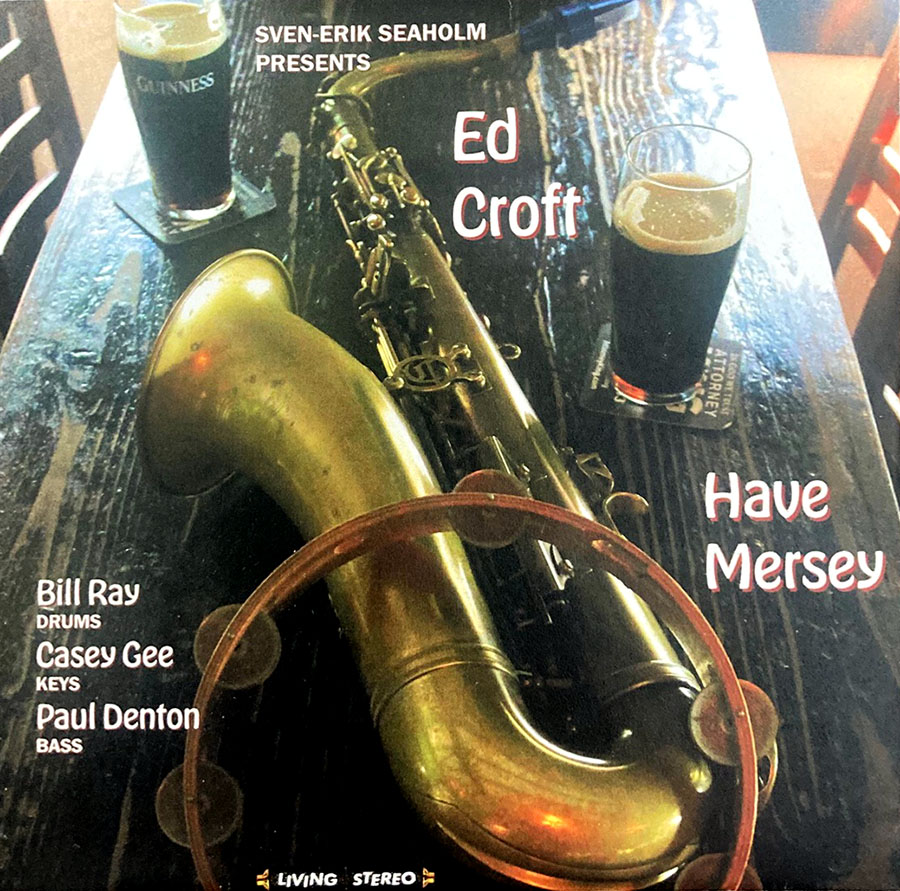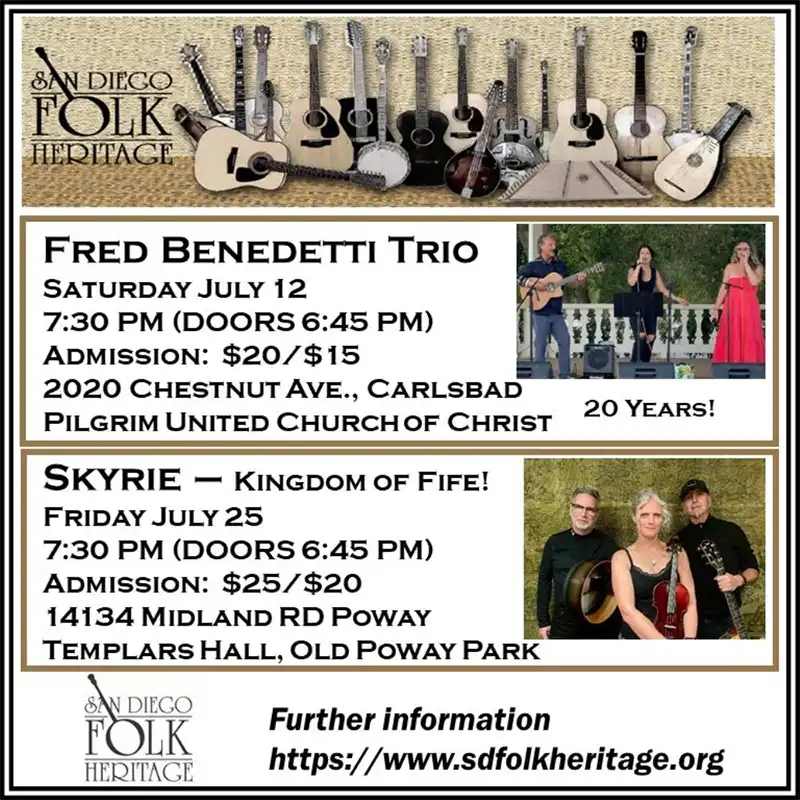CD Reviews
ED CROFT: Have Mersey

San Diego tenor saxophonist Ed Croft has a new collection of rock ‘n’ roll and R&B covers, collected under the title Have Mersey.
It turns out the title is more a clever play on words than a declaration of stylistic intent, because this collection takes in far more than the Mersey Beat of the early 1960s. (Mersey being the river that runs through Liverpool and gives the surrounding area its name.)
It is, however, largely an homage to the British Invasion, with takes on songs from everyone from Manfred Mann to the Zombies, the Dave Clark 5 to the Merseys, and, yes, even a second-hand nod to the Fab Four.
The set opens with a raucous cover of a bit of a collector’s item, “Twist at the Top,” a 1962 single by Liverpool’s Howie Casey and the Seniors. While the original song featured a lead vocal by Derry Wilkie backed by Casey’s tenor sax, here Croft and Sven-Erik Seaholm arrange it as an instrumental with Croft trading—and sometimes sharing—leads with guest guitarist Scotty Blinn (Black Market III, Mississippi Mudsharks). Just on this one track, Croft finds a sound blending the classic R&B tenor sounds of Big Jay McNeely and King Curtis with more contemporary blues tenor players like A.C. Reed, Grady Gaines, and Eddie Shaw. Blinn’s guitar work recalls the heyday of Mickey Baker’s late 1950s R&B instrumentals.
The next track, a cover of the Zombies’ 1964 hit “She’s Not There,” is a tight reimagining of a song already defined both by its original version and Santana’s 1977 cover. Here, Croft’s sax (more in a Plas Johnson vein than a honking jump blues) replaces the lead vocal, underpinned by Craig Goldy (Rough Cutt, Giuffria) on guitar and Casey Gee’s soulful organ work. Goldy’s muscular, metal-tinged solo about halfway through provides a pleasant jolt to the soul-jazz groove without overriding it.
Burt Bacharach’s “My Little Red Book,” recorded by Manfred Mann for the 1965 film “What’s New Pussycat?” (albeit not made into a hit until the next year by American band Love), is turned in as a surf-inflected shuffle. It is an interesting arrangement, in that Manfred Mann recorded two versions, the one that appears in the film, and then a more uptempo version that came out on their own My Little Red Book of Winners LP later that year. And the hit version by Love was played at an even faster tempo. Croft is back to the grittier tone of the first track, while guest guitarist Scott Seader (Trikuti) lays into a full-on Ventures approach.
“Sorrow” was a bit of a cross-Atlantic re-invasion. The McCoys wrote and recorded the song in 1965 but as the B side of the “Fever” single. However, the Merseys issued their own poppier, peppier version a year later, and it shot up the U.K. charts. In 1973, David Bowie issued his own version, slowed down from the Merseys’ take, closer to the pacing of the McCoys’ original. Here, Croft takes the vocal lead on tenor sax, with Rick Wilkins (The Nards, Sara Petite) creating a shimmering background on lap steel (and reuniting him with former Outriders bandmate Paul Denton, who plays bass throughout this album). The pace is closer to the McCoys-Bowie versions, although Wilkins’ sinuous guitar is wholly original—with Casey Gee’s acoustic piano also offering a different take on the theme. This is probably the track that most stands out from the original version(s) and yet is wholly faithful to the melody.
The next track jumps ahead to 1971 for a reworking of the Fortunes’ power-pop nugget “Here Comes That Rainy Day Feeling Again.” Croft’s tenor sax here is in more of a jazz vein and maintains that gorgeous melody front and center. Guitarist Charlie Loach (The Wild Truth) balances that jazziness with a rock edge to his fills and even rhythm work behind Croft.
The Beatles nod comes on a cover of “Till There Was You,” from Meredith Wilson’s The Music Man musical. Dozens of artists covered the song after the show became a hit on Broadway, following its 1957 debut. Shirley Jones sang it in the film version in 1962, and then Paul McCartney sang lead vocal on the Beatles’ second album in 1963 in a subdued, straight-up cover. Croft here approaches it fairly close to the Beatles—and Shirley Jones—pace, with his fat, tenor sax taking the vocal part, while Eric Lieberman (Blue Largo) provides a nice, equally resonant hollow-body electric guitar counterpoint.
“Keep on Running” is another song with a complicated history. Originally recorded by its composer, Jamaican singer Jackie Edwards, in 1966, it as quickly covered by the Spencer Davis Group, which gave it more of a growling edge and a sense of danger. Croft and guitarist Joey Harris (Joey Harris & the Mentals, Powerthud, the Beat Farmers) come storming out of the gates with even more snarling menace than the Spencer Davis Group version. They share the lead, then alternate leads, complemented by Gee on organ. It is nearly as much reinvention as rediscovery.
“(All I Need Is) The Air That I Breathe” was written—and originally recorded—by Albert Hammond for his 1973 debut. The next year, the Hollies took their cover right up the charts. What was interesting was that the Hollies basically used Hammond’s arrangement, but added lush strings and gorgeous three-part harmony vocals. Croft and Co. speed the pace up a touch from the earlier versions, with tenor sax handling the vocal part. Producer and guest guitarist Sven-Erik Seaholm combines with Gee on piano to concisely frame Croft’s leads.
The Dave Clark Five’s 1964 single, “Because,” gets a New Orleans twist, with Gee’s acoustic piano hearkening to Professor Longhair’s Caribbean syncopation behind Croft’s tenor sax handling the melody. This may be the track that would be the toughest entry on an “I can name that song in XX notes” contest, just given the different arrangement.
Another cross-Atlantic cover is “Goodbye My Love.” Originally recorded as “Goodbye My Lover Goodbye” by American singer Robert Mosley (who co-wrote it with Leroy Swearingen and Lamar Simington) in 1963, it was covered by Liverpool’s the Searchers in 1964, with that more polished version becoming a hit. Croft’s reading doesn’t really hew to either of those versions; it’s more uptempo, with Croft’s sax providing a brighter, brassier take on the lead than the rather subdued vocals by both Mosley and the Searchers. Also, the sharp, cutting guitar leads from Dave Gleason add a twangy edge that makes this interpretation unique.
“Bend Me, Shape Me” has no obvious Brit history; it was written by Scott English and Larry Weiss and first recorded by Cleveland rockers the Outsiders in 1966, with a 1967 version by the American Breed (out of Chicago) that hit the Top 10. The Outsiders’ take was stripped-down psychedelia, while the American Breed had a much more polished arrangement, with a horn section punctuating the vocal choruses. Croft comes at it closer to the American Breed’s version—uptempo, muscular—with guitarist Nathan Raney adding a bit of roots toughness.
The closing song brings things back to the British Invasion, with a cover of “Ferry Cross the Mersey,” the 1964 hit by Gerry and the Pacemakers. The atmospheric opening sounds more like an exotica song by Martin Denny than it does an early ’60s rock ‘n’ roll ballad. Seaholm does a nice job on electric guitar of setting up Croft’s lead on tenor sax, and Croft stays right in the melody’s sweet spot.
Throughout, drummer Bill Ray and Paul Denton (mentioned above) on bass are foundational, solid, swinging, able to shift gears, to adapt to any groove, to create any mood. There’s a pretty wide range of styles here and a parade of different guitarists, yet Denton and Ray sound unflappable.
And that solid base gives Croft the support he needs to tackle these covers of songs both legendary and underappreciated, most with a new, fresh approach, courtesy of the arrangements of Croft and producer Seaholm.






